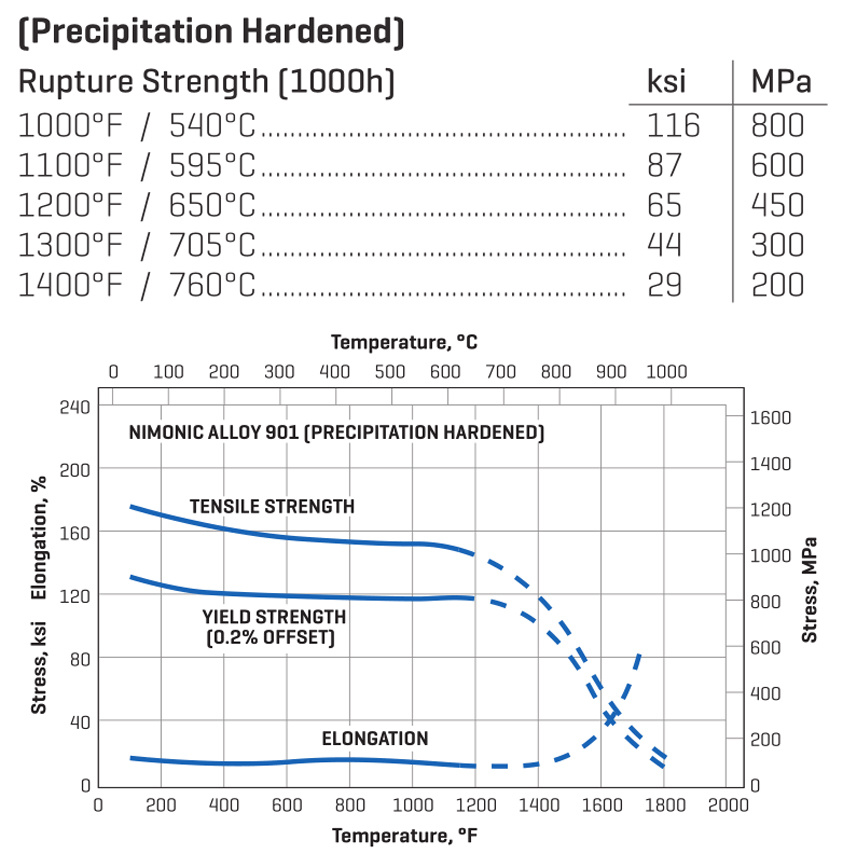Product Description
A nickel-iron-chromium alloy containing titanium and aluminum for precipitation hardening and molybdenum for solid-solution strengthening. The alloy has high-yield strength and creep resistance at temperatures to about 1110°F (600°C). A substantial iron content enables the alloy to combine high strength with good forging characteristics. Used in gas turbines for discs and shafts.
STANDARD PRODUCT FORMS
Flat or round bar, extruded section and forging billet.
MAJOR SPECIFICATIONS
UNS N09901, BS HR55, SAE AMS 5660, 5661, AECMA Pr EN 2176 – 2178, Werkstoff Nr. 2.4662, ISO 9723, 9725
LIMITING CHEMICAL COMPOSITION, %
Nia.....40.0 – 45.0
Fe ......Remainder
Cr......11.0 – 14.0
Mo .........5.0 – 6.5
aPlus Co.
Ti ...........2.8 – 3.1
Al .........0.35 max.
C ............0.1 max.
Si ...........0.4 max.
Cu..........0.5 max.
Mn .........0.5 max.
Co ..........1.0 max.
S ..........0.03 max.
Fe ......Remainder
Cr......11.0 – 14.0
Mo .........5.0 – 6.5
aPlus Co.
Ti ...........2.8 – 3.1
Al .........0.35 max.
C ............0.1 max.
Si ...........0.4 max.
Cu..........0.5 max.
Mn .........0.5 max.
Co ..........1.0 max.
S ..........0.03 max.
PHYSICAL CONSTANTS AND THERMAL PROPERTIES
Density, Ib/in3 ........................................................................0.294
g/cm3 .........................................................................8.14
Melting Range, °F ...................................................2335 – 2455
°C ...................................................1280 – 1345
Specific Heat, Btu/lb • °F ....................................................0.103
J/kg • °C ...........................................................431
Permeability at 200 Oersted (15.9 kA/m) ....................1.013
Coefficient of Expansion, 68 – 212°F, 10-6 in/in • °F .......7.5
20 – 100°C, µm/m • °C .........13.5
Electrical Resistivity, ohm • circ mil/ft ...............................674
µ Ω• m ................................................1.12
g/cm3 .........................................................................8.14
Melting Range, °F ...................................................2335 – 2455
°C ...................................................1280 – 1345
Specific Heat, Btu/lb • °F ....................................................0.103
J/kg • °C ...........................................................431
Permeability at 200 Oersted (15.9 kA/m) ....................1.013
Coefficient of Expansion, 68 – 212°F, 10-6 in/in • °F .......7.5
20 – 100°C, µm/m • °C .........13.5
Electrical Resistivity, ohm • circ mil/ft ...............................674
µ Ω• m ................................................1.12
TYPICAL MECHANICAL PROPERTIES

previous
next
previous
next
Key words:
Related Products
Online message
SHANGHAI KANGSHENG AVIATION MATERIALS TECHNOLOGY CO., LTD.
Address: No. 5999, Huyi Road, Waigang Town, Jiading District, Shanghai
Tel:13641813331
Technical support:13671903676
Emial:ksalloy@ksalloy.com
Copyright: 2022 Shanghai Kangsheng Aviation Materials Technology Co., Ltd.
Powered By:www.300.cn SEO








